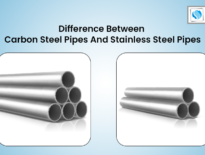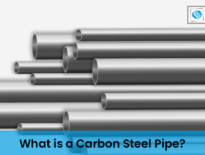What is Carbon Steel Pipe?
Carbon steel pipe is a type of steel pipe made from a carbon and iron alloy. It is mainly composed of carbon and iron, with other elements such as manganese, silicon, sulfur, and phosphorus present in trace amounts. The carbon content in carbon steel pipes can range from 0.04% to 2.1% by weight.
Specification of Carbon Steel Pipe
Carbon steel pipes come in various specifications to suit different applications. They are available in a wide range of sizes, from 1/2” NB to 36” NB. These pipes are manufactured according to different standards, including:
- ASTM A/ASME SA 106 Grade A, B, C
- ASTM A/ASME SA 53 Grade A, B
- API 5L – PSL 1 Gr. A, B, X42, X46, X52, X56, X60, X65, X70
- ASTM A/ASME SA 333 Grade 1, 6
Types of Carbon Steel Pipes
There are several types of carbon steel pipes designed for various applications:
-
Carbon Steel Seamless Pipes:
These pipes contain more carbon and iron in their composition. They are stronger and more resistant to stress, making them suitable for heavy-duty applications.
-
Carbon Steel ASTM A335 Pipes:
ASTM A335 pipes are made from carbon steel with additional elements such as manganese, phosphorus, sulfur, silicon, chromium, and molybdenum. They are known for their durability, wear resistance, and high tensile strength.
-
Carbon Steel Fabricated Pipes:
Fabricated carbon steel pipes offer high durability, corrosion resistance, and tensile strength. They find applications in various industries such as oil & gas, chemical, metallurgical, energy, and shipbuilding.
-
Carbon Steel Welded Pipes:
Welded carbon steel pipes are used in high-pressure conditions. They are commonly used in industries such as water and waste transportation, oil and gas, chemical manufacturing, and high-pressure applications.
-
Carbon Steel ERW Pipes:
ERW (Electric Resistance Welded) carbon steel pipes are lightweight, corrosion-resistant, and structurally sound. They are used in various industries including shipbuilding, automobile, boilers, pressure vessels, railways, oil & petrochemicals, coal & mining, transmission towers, and general & heavy engineering.
-
Carbon Steel LSAW Pipes:
LSAW (Longitudinal Submerged Arc Welding) carbon steel pipes are known for their easy installation, seamless finish, and rustproof properties. However, they are more expensive and not widely used in lower-value applications such as water pipelines.
ASTM A106 Pipe:
- ASTM A106 pipe refers to carbon steel pipes made through hot rolled or cold drawn seamless methods. These pipes are designed for high-temperature services, making them suitable for conveying fluids like water, oil, gas, and slurry. They are commonly used in mining industries due to their heat-resistant properties.
ASTM A53 Pipe:
- ASTM A53 pipe includes both welded and seamless steel pipes, typically made from carbon black material and occasionally hot-dipped galvanized (zinc-coated). These pipes are widely used in mining and slurry services due to their versatility and reliability.
Conclusion
Carbon steel pipes are versatile and widely used in various industries due to their strength, durability, and resistance to corrosion and stress. With different specifications and types available, they can be tailored to suit specific applications, making them an essential component in many industrial processes.
For more information about our range of carbon steel products, please contact us.


